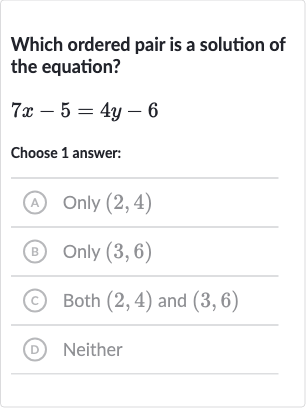Full solution
Q. Which ordered pair is a solution of the equation? Choose answer: (A) Only (B) Only (C) Both and (D) Neither
- Rewrite equation in slope-intercept form: Rewrite the equation in slope-intercept form .To do this, we need to solve for .Start with the given equation: Add to both sides: Simplify: Divide both sides by : The equation in slope-intercept form is
- Check ordered pair : Check if the ordered pair satisfies the equation .Substitute and into the equation: Calculate the right side: Find a common denominator and add: Combine the fractions: Since does not equal , the ordered pair is not a solution.
- Check ordered pair : Check if the ordered pair satisfies the equation .Substitute and into the equation: Calculate the right side: Combine the fractions: Simplify the fraction: Since does not equal , the ordered pair is not a solution.
More problems from Does (x, y) satisfy the linear equation?
QuestionGet tutor help
QuestionGet tutor help

